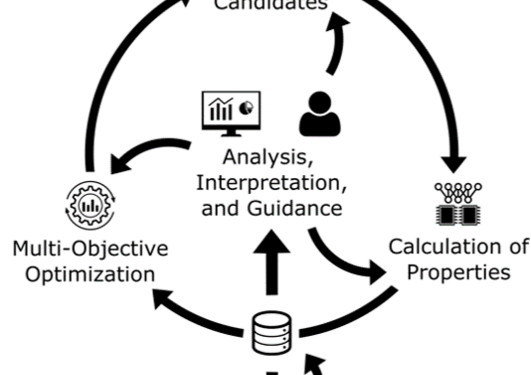- E-mailmarco.foscato@uib.no
- Visitor AddressRealfagbygget, Allégaten 415007 BergenRoom2033 (2F3c)
- Postal AddressPostboks 78035020 Bergen
Dr. Marco Foscato is a member of the In silico molecular exploration and design group at the Department of Chemistry.
Dr. Marco Foscato envisions a near future where computational chemistry tasks and computationally assisted molecular design are fully automated to impact maximally on discovery of functional molecules in general and transition-metal catalysts, in particular. To pursue this vision, he develops and apply cheminformatics tools that automate chemical and computational chemistry tasks. Dr. Foscato is the main developer and maintainer of the most versatile and generally applicable software package available for automated de novo design of molecules: De Novo OPTimization of In/organic Molecules (DENOPTIM). Notably, DENOPTIM is the first of its kind to have successfully designed, in a de novo and fully automatic fashion, functional transition metal compounds that were only later experimentally proven to possess the designed property (See Chem. Eur. J. 2018, 24, 5082).
- (2024). Automated de Novo Design of Olefin Metathesis Catalysts: Computational and Experimental Analysis of a Simple Thermodynamic Design Criterion. Journal of Chemical Information and Modeling. 412-424.
- (2022). The Janus face of high trans-effect carbenes in olefin metathesis: gateway to both productivity and decomposition. Chemical Science. 5107-5117.
- (2021). Bimolecular Coupling in Olefin Metathesis: Correlating Structure and Decomposition for Leading and Emerging Ruthenium−Carbene Catalysts. Journal of the American Chemical Society. 11072-11079.
- (2020). Ethylene-Triggered Formation of Ruthenium Alkylidene from Decomposed Catalyst. ACS Catalysis. 6788-6797.
- (2020). Challenging Metathesis Catalysts with Nucleophiles and Brønsted Base: Examining the Stability of State-of-the-Art Ruthenium Carbene Catalysts to Attack by Amines. ACS Catalysis.
- (2019). DENOPTIM: Software for Computational de Novo Design of Organic and Inorganic Molecules. Journal of Chemical Information and Modeling. 4077-4082.
- (2018). Spin Crossover in a Hexaamineiron(II) Complex: Experimental Confirmation of a Computational Prediction. Chemistry - A European Journal. 5082-5085.
- (2018). Rapid decomposition of olefin metathesis catalysts by a truncated N-heterocyclic carbene: Efficient catalyst quenching and n-heterocyclic carbene vinylation. ACS Catalysis. 11822-11826.
- (2018). Bimolecular Coupling as a Vector for Decomposition of Fast-Initiating Olefin Metathesis Catalysts. Journal of the American Chemical Society. 6931-6944.
- (2017). Loss and Reformation of Ruthenium Alkylidene: Connecting Olefin Metathesis, Catalyst Deactivation, Regeneration, and Isomerization. Journal of the American Chemical Society. 16609-16619.
- (2017). Decomposition of Olefin Metathesis Catalysts by Br?nsted Base: Metallacyclobutane Deprotonation as a Primary Deactivating Event. Journal of the American Chemical Society. 16446-16449.
- (2016). Computer-aided molecular design of imidazole-based absorbents for CO2 capture. International Journal of Greenhouse Gas Control. 55-63.
- (2015). Ring closure to form metal chelates in 3D fragment-based de novo design. Journal of Chemical Information and Modeling. 1844-1856.
- (2015). Integration of ligand field molecular mechanics in Tinker. Journal of Chemical Information and Modeling. 1282-1290.
- (2015). Evolutionary de novo design of phenothiazine derivatives for dye-sensitized solar cells . Journal of Materials Chemistry A. 9851-9860.
- (2014). Automated design of realistic organometallic molecules from fragments. Journal of Chemical Information and Modeling. 767-780.
- (2014). Automated building of organometallic complexes from 3D fragments. Journal of Chemical Information and Modeling. 1919-1931.
- (2013). Thermodynamic analysis of enzyme enantioselectivity: a statistical approach by means of new differential HybridMIF descriptors. Biocatalysis and Biotransformation. 272-280.
- (2019). Changing Oxidation State Paradigms in Ruthenium-Catalyzed Olefin Metathesis.
- (2017). Loss and Reformation of Ruthenium Alkylidene: Connecting Olefin Metathesis, Deactivation, Regeneration, and Isomerization.
- (2017). Cheminformatics for the Design of Functional Transition Metal Compounds.
- (2016). Computational Design of Functional Organometallic Complexes.
- (2015). Evolutionary de novo design of absorbents for CO2 capture.
- (2015). Evolutionary de novo design of absorbents for CO2 capture.
- (2024). Interplay Between Tridentate Pincer Molybdenum Catalysts and SmI2 in Ammonia Synthesis.
- (2024). Exploring the Potential of 45Ti in PET Imaging, Formation and Assessment of the Ti-DOTA Complex.
- (2023). Establishing Protocols for Automated De Novo Design of Olefin Metathesis Catalysts.
- (2022). Taming cyclicity of Transition Metal Complexes in De Novo Design.
- (2022). Protocols for Automated Evaluation of Olefin Metathesis Catalysts.
- (2019). Oxidation State Paradigms in Olefin Metathesis.
- (2019). Automated Computational Design of Catalysts.
- (2018). Automated in silico design of homogeneous catalysts.
- (2017). Loss and Reformation of Ruthenium Alkylidene: Connecting Olefin Metathesis, Catalyst Deactivation, Regeneration, and Isomerization.
- (2015). Automated design of realistic organometallic complexes and catalysts.
- (2015). Automated Prediction of Optimized Ruthenium Catalysts for Olefin Metathesis.
- (2015). Automated Prediction of Optimized Ruthenium Catalysts for Olefin Metathesis.
- (2014). Evolutionary de novo design of absorbents for CO2 capture.
- (2014). Automated in Silico Design of Homogeneous Catalysts.
- (2019). DE Novo OPTimization of In/organic Molecules (DENOPTIM).
- (2015). A method for automated de novo design of functional transition-metal compounds.
- (2015). Evolution inspector: Interactive visual analysis for evolutionary molecular design. 2 pages.
- (2024). Unlocking the Potential of 45Ti for PET-imaging: The Formation and Evaluation of the Ti-DOTA Complex .
- (2024). Titanium-45-DOTA for PET-imaging: L'enfant Terrible.
- (2023). Multifaceted Impact of High Trans Influence/Effect in Ru-CAAC Olefin Metathesis Catalysts.
- (2023). Interplay Between Tridentate Pincer Molybdenum Catalysts and SmI2 in Ammonia Synthesis.
- (2023). Automated De Novo Design and Experimental Validation of Ru-Catalysts for Metathesis: Testing the Limits of a Correlation-Based Design Criterion.
- (2019). Reviving Metathesis: Ethylene-Triggered Formation of Ruthenium-Alkylidene .
- (2019). Automated design of Fe(II) spin crossover compounds: a successful story.
- (2017). Mechanisms Connecting Olefin Metathesis, Catalyst Deactivation, Regeneration, and Isomerization.
- (2017). In Silico Evaluation of Olefin Metathesis Catalysts: the Importance of Monitoring More than One Elementary Reaction.
- (2015). Evolutionary de Novo Design of Absorbents for CO2 Capture.
- (2014). Automated Design of Organometallic Compounds from 3D Fragments.
- (2014). A de novo design approach to enhance the optical properties of azobenzenes.
- (2013). QSPR-Guided de novo Design of Organic Photovoltaic Dyes.
- (2013). Automatic building of transition metal compounds from fragments: a class-based approach.
- (2012). DENOPTIM: De novo OPTimization of Inorganic Molecules.
- (2012). DENOPTIM: De novo OPTimization of Inorganic Molecules.
- (2020). Automated in silico design of homogeneous catalysts. ACS Catalysis. 2354-2377.
- (2024). Evolutionary Algorithms and Workflows for De Novo Catalyst Design. 540-561. In:
- (2024). Comprehensive Computational Chemistry. Elsevier.
More information in national current research information system (CRIStin)
Led by Prof. Deyn Fogg, the WattCat project (Water-tolerant catalysis: Boosting chemical biology, medicine, and sustainable chemical manufacturing) aims to develop ruthenium-based olefin metathesis catalysts that enable challenging metathesis reactions in the presence of water.
Led by Prof. Vidar R. Jensen, the eHACS project (Escaping the Combinatorial Explosion: Expert-Enhanced Heuristic Navigation of Chemical Space) aims to integrate modern automated molecular design methods with knowledge-based expert guidance and machine learning. This project includes substantial development of DENOPTIM. Stay tuned for new and outstanding functionality!
e-Science for e-Ammonia
Led by Prof. Vidar R. Jensen, this project aims to develop methods for automated design of transition metal catalysts for the so-called e-ammonia process, i.e., ammonia production based on renewable electricity, dinitrogen and water. This project includes substantial development of DENOPTIM. Stay tuned for new and outstanding functionality!
DENOPTIM (De Novo OPTimization of In/organic Molecules) is an open source software package for de novo design and virtual screening of functional molecules of any kind. It is meant to be general and pose no limits to the kind of chemistry of the compounds to be designed.
See the development site on GitHub and the original publication on the Journal of Chemical Information and Modeling, here.
News:
- (30 Nov – 1 Dec 2020) Online introductory workshop on DENOPTIM.
- (Apr 2022) DENOPTIM is now available in the Anconda repository.
- (9th – 11th, May 2022) Computational molecular design workshop in the NordCO2 summer school: theory and practice of de novo design with DENOPTIM
- (Aug 2022) A complete list of hand-on tutorials in now available online. From installation to complex de novo design tasks. Have fun!
- (29 Oct 2022) DENOPTIM is now available on confa-forge!

